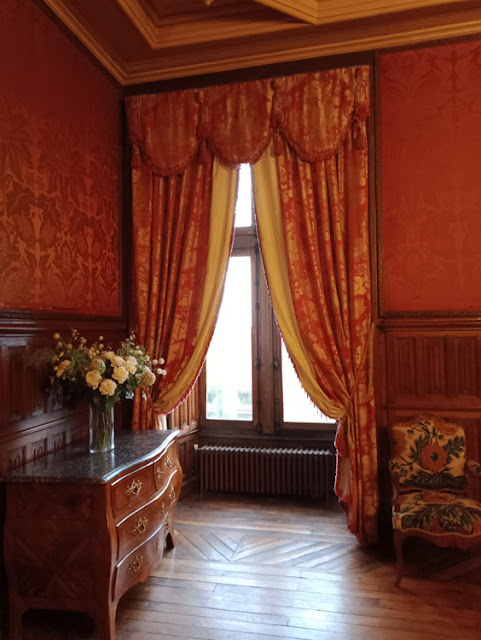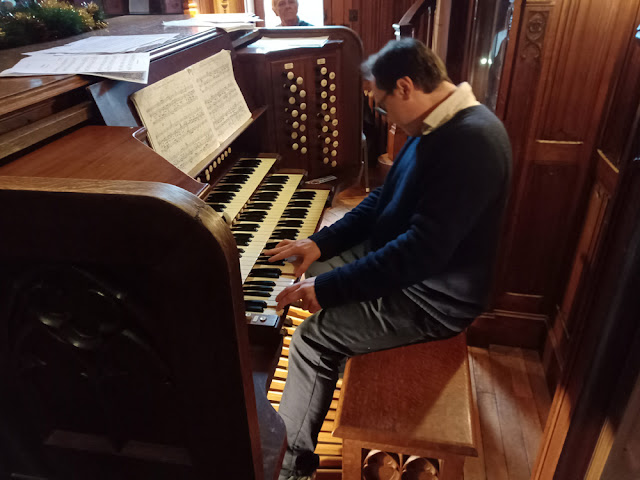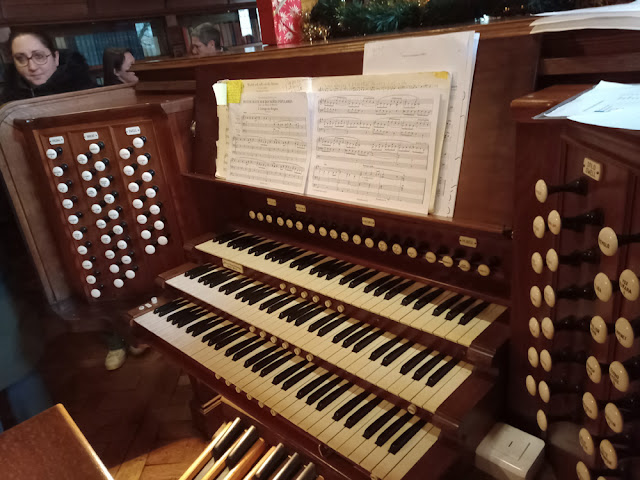 |
The curator waxing lyrical about a bakelite connection unit, without dozens of which the organ could not function.
|
For my birthday recently we went to the Domaine de Candé for one of their occasional and intimate organ recitals. Candé is in a somewhat unusual position that the Skinner organ in the library of the chateau is a listed monument, but the building itself is not. It means that they have had to be exceptionally creative in terms of how they access funding and how they keep the place running.
 |
| Stableblock. |
The Skinner organ is one of only about 15 in the world and the only one in Europe which is in full working order. It was installed in the chateau by Charles Bedaux and Fern Lombard Bedaux in 1929. Fern was apparently a talented soprano, who might have had a professional career if she had not married. Neither of them were organ players though, and they used the organ's extensive collection of song rolls. The organ is a combination of house organ, church organ and theatre organ, and can be played manually or automatically. It is so powerful that I'm told it can be heard at the secret atomic research facility 3 kilometres away.
 |
Gobelins curtains in the salon.
|
Curiously, once the organ was installed, the Bedaux's don't seem to have done any maintenance, despite how delicate and complex the instrument is. The pipes in the attic were open to the corridor in the servants quarters, not scrupulously protected from dust with a glass viewing partition as there is today after the restoration in 2010. One of the reasons the organ is played regularly is that it blows the dust out of connections.
 |
We noticed for the first time that the door and doorway into the music room appears to have been altered but we don't know why or when.
|
On my birthday it was very cold, and the chateau interior had been heated to comfort levels for the audience of twelve people. It was misbehaving because it prefers to be cold and doesn't like changes in temperatures and humidity. Organs in churches don't suffer from this problem because they are always cold, and church organists have to get used to it.
 |
The organist from Eglise St Cyr et St Julitte in St Cyr sur Loire playing the house organ in the library of the Chateau de Candé.
|
One recent change to the organ's operating arrangements was triggered by the fire in Notre-Dame de Paris. The bellows have been moved from the roof space to down where they can be more easily monitored, and modified to be more modern. The original bellows has two dynamos that throw sparks and it was feared that they might cause a fire in the roof.
 |
There are nearly 2000 organ pipes, now protected behind a partition in the attic. The wooden louvres on the right are operated by the organist and control the level of volume that comes down the shaft into the library where the audience sits.
|
The curator was telling me that she has worked at the site for 15 years now. She can remember when the salon was empty except for a television. The television has now gone and the room has Fern Bedaux's furniture reinstated. When the property was gifted to the nation on Fern's death, all the furniture was removed to the National Furniture Collection as the chateau was not in a fit state to be open to the public. As a result, some of it has not come back to Candé. Some government minister is using Charles Bedaux's desk, so the one in his study is a replacement. None of the furniture in Fern's bedroom is hers either, as she gave away more personal things to friends. The dining room table is from the Chateau of Plessis at Ballan-Miré, and the table from Candé is in the Chateau of Azay le Rideau, also owned by the State and furnished from the National Furniture Collection.
 |
View from one of the attic windows.
|
The curator would dearly like to get her hands on the FBI archive that has details of the arrest at the end of the Second World War and the death in custody of Charles Bedaux, but unfortunately she just doesn't have the budget. Because the property's budget is precarious and dependent on being linked to the organ, this interesting chateau has taken a long time to find its place, and is still almost unknown. Unlike the other more famous Loire Valley chateaux, which look back to the Renaissance, the Chateau of Candé represents the period between the Wars and the Nouveau Riche. It is a glimpse into a way of life most associated with the lost glamour of the Titanic, with its mix of the expensive wood panelling and luxury textiles from the 19th century blended with rare surviving gymnasium machines from the early 20th century and American style plumbing and telephone system.
 |
In the dining room.
|
 |
The console of the organ.
|
 |
A corner of the corridor in the servants' quarters in the attic.
|
 |
Detail of some of the organ controls.
|












1 comment:
Thanks for introducing me to Gobelin fabric! Best wishes to you both for the New Year.
Post a Comment